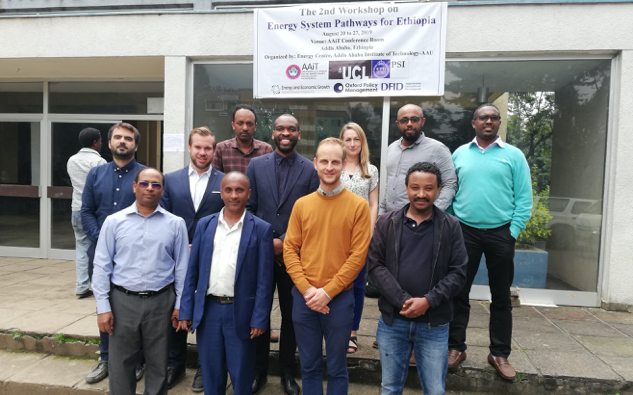Energy system development pathways for Ethiopia (PATHWAYS)
Understanding how behavioural issues that affect the overall demand for electricity and the future generation mix is vital for energy planning and the development of robust and appropriate energy poli

29 September 2020
The principal aim of this project is to develop possible transition pathways in Ethiopia to modern energy – specifically clean electricity – by incorporating behavioural issues in energy system modelling. It will address the knowledge gap on how evolving demand for electricity and demand side policies (such as efficiency improvements and price changes) affects energy system development pathways and their economics.
To enhance energy modelling activities in Ethiopia, the team will develop new models, and build on existing ones developed for research and policy formulation. These will be used to outline different energy system development pathways that meet the fast-growing demand for electricity in the country. Both quantitative (modelling) and qualitative (interviews, stakeholder workshops, and questionnaires) methods will be used to identify and quantify the energy, economic, and environmental impacts of energy system development pathways for Ethiopia.
The project consists of six work packages. The first four are research-focused, covering resource and capacity development pathways; electricity demand, productive use, and consumer behaviour (providing a deeper understanding of how consumers behave under various policies, such as energy efficiency improvements and pricing); on-grid and off-grid planning and coordination; and energy system planning and modelling. The fifth work package comprises project management and integration, and the sixth involves dissemination, stakeholder engagement, and capacity development.
The anticipated outcomes include innovation in energy modelling software technology, with country-specific models being generated using the Open-Source Electrification Toolkit (OnSSET) and the Open-Source energy Modelling System (OSeMOSYS). These will be uniquely created to reflect country specifics – including underlying data and policy challenges.
The tools developed will be available and appropriate for end users, and will include training on the use of the developed models for research and policy. The basic research data needed for model-based policy analysis will be made available via an online wiki that can easily be updated, reviewed, and republished. This data will include a detailed mapping of existing energy infrastructure and renewable energy potentials. Unlike other energy data compilations, this will be targeted to accelerate model building, policy, and academic analysis.
- Impact, Influence & Outreach
The project will enhance the modelling and analytical capacity of academic and research institutions, and in government institutions, for example the Ministry of Energy, Water and Irrigation (MoWIE) and development organisations.
- List of outputs
A Residential sector LEAP model for Ethiopia
An open source OSeMOSYS energy system model for Ethiopia
An open source OnSSET electricity sector model for Ethiopia- People
Dr Gabrial Anandarajah (PI)
Dr Femi Eludoyin
Dr Julia Tomei
Mr Oliver Broad
Dr Ben Milligan- Collaborators
Dr Will Usher (Co-I), KTH Royal Institute of Technology, Sweden. wusher@kth.se
Dr Sied Hassen (Co-I), Policy Studies Institute, Ethiopia. seidy2004@gmail.com
Dr Solomon Tesfamariam Teferi (Co-I), Addis Ababa Institute of Technology, Ethiopia. solomontem@yahoo.com
- Links
 Close
Close

